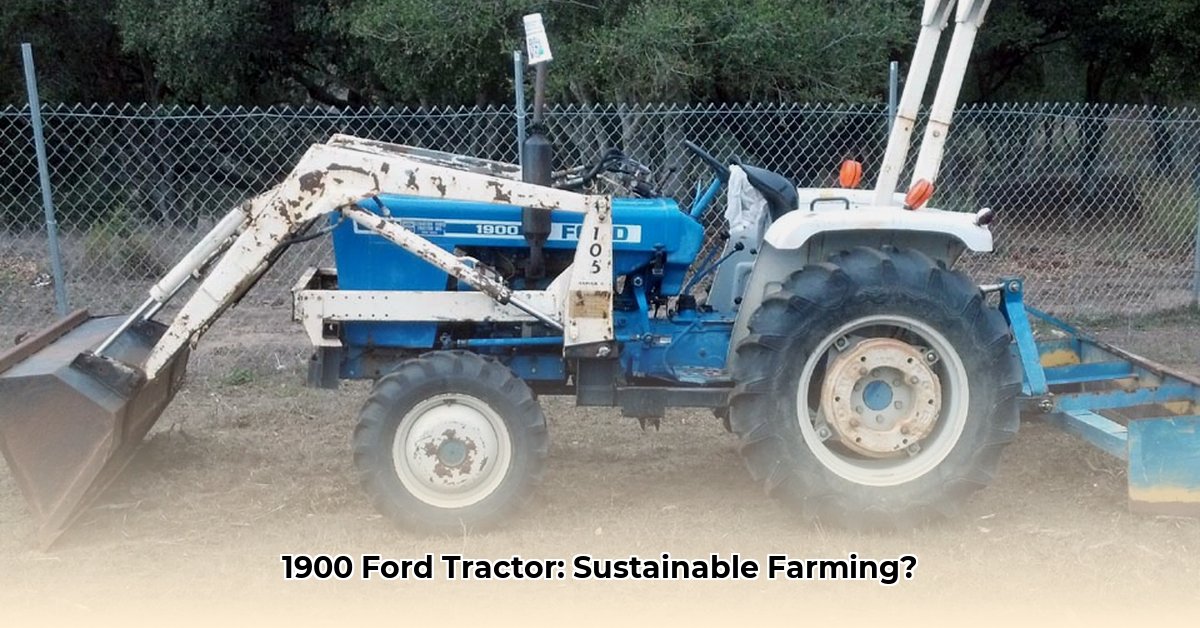
1900 Ford Tractor: A Compact Powerhouse for Sustainable Agriculture
The Ford 1900 tractor, a relatively unknown gem in agricultural history, quietly revolutionized farming for many. Manufactured by Shibaura from 1979 to 1983, this compact tractor offered a compelling alternative to the larger, fuel-guzzling machines dominating the landscape. Its nimble design and surprising efficiency made it an ideal tool for smaller farms, foreshadowing the modern emphasis on sustainable agriculture. But how did this little tractor make such a big impact? Let's delve into its story. For more on modern tractor costs, see this helpful resource.
The Unsung Hero of Eco-Conscious Farming
Imagine a time when fuel costs soared and large-scale farming operations held sway. Smaller farms struggled to compete, facing financial strain and increasing environmental concerns. The 1900 Ford tractor provided a lifeline. With a modest 30 horsepower engine (sufficient for many smaller farms), its compact size proved to be its most significant asset, allowing it to maneuver easily through smaller fields and orchards. This minimized soil compaction, a major contributor to soil degradation, and significantly reduced fuel consumption compared to larger tractors. This efficiency translated directly into lower operating costs and a smaller carbon footprint, key principles of sustainable agriculture. Isn't it remarkable how a seemingly small detail like reduced soil disturbance can have such a positive environmental impact?
This efficiency extended beyond fuel savings. The 1900 Ford’s smaller footprint minimized soil disruption, leading to healthier soil and reduced erosion. Its 7.7-gallon fuel tank allowed for extended periods of work in smaller fields before refueling became necessary – a significant boost in productivity and a reduction in labor time.
Adaptability: The Versatile Workhorse
The true brilliance of the 1900 Ford lay in its remarkable versatility. This wasn't a one-trick pony; its adaptability was a game changer. A wide array of attachments transformed it from a tiller to a mower, snowplow, or specialized cultivator, catering to diverse farming needs. This eliminated the need for multiple specialized machines, saving farmers money and reducing the environmental impact associated with manufacturing and transporting additional equipment. This versatility alone underscores its contribution to cost-effective and environmentally friendly farming practices. This adaptability mirrors current sustainable farming principles – maximizing resource utilization and minimizing waste.
A Legacy of Sustainable Innovation
The 1900 Ford wasn't just a machine; it represented a shift in agricultural thinking. Its design mirrored a growing awareness of the need for efficient, environmentally conscious farming methods. It provided a viable option for smaller farms, enabling them to thrive in a landscape dominated by larger operations. The tractor's impact wasn't about sheer power, but about smart engineering and sensible design, priorities that remain vital in modern sustainable agriculture. This focus on efficiency and adaptability is crucial in modern discussions of environmental sustainability.
The 1900 Ford's Lasting Impact
Though production ceased decades ago, the 1900 Ford’s influence endures. It serves as a compelling example of how sustainable solutions can emerge from simple, well-engineered designs. Its compact size and adaptability laid the groundwork for more sustainable practices on smaller farms, demonstrating that progress in agriculture doesn't always necessitate massive, complex machinery. The 1900 Ford stands as a powerful symbol of effective, environmentally conscious innovation in agricultural technology. It's a testament to the enduring power of smart design.
Weighing the Pros and Cons
While the 1900 Ford offered many advantages, it wasn't without limitations.
| Feature | Pros | Cons |
|---|---|---|
| Size & Power | Compact and maneuverable; sufficient power for numerous tasks. | Limited horsepower; unsuitable for large-scale farming operations. |
| Fuel Efficiency | Relatively fuel-efficient for its era. | Small fuel tank; more frequent refueling might be needed for larger fields. |
| Versatility | Wide array of attachments for diverse farming operations. | Availability of attachments might be limited; some attachments could be costly. |
| Historical Impact | Significant contribution to sustainable farming on smaller holdings. | Limited readily available comprehensive long-term environmental data. |
The challenges of finding replacement parts today shouldn’t overshadow its historical importance. The 1900 Ford played a crucial, often overlooked, role in shaping the landscape of sustainable agriculture.
Key Takeaways:
- The Ford 1900's compact size and fuel efficiency are perfectly suited to sustainable, small-scale farming.
- Its versatility, thanks to numerous attachments, made it an adaptable tool for various farming tasks.
- The 1900 Ford's legacy demonstrates that sustainable practices can stem from smart engineering, not just advanced technology.
The 1900 Ford Tractor’s story is a testament to the power of efficient design and its lasting contributions to sustainable agriculture deserve recognition.